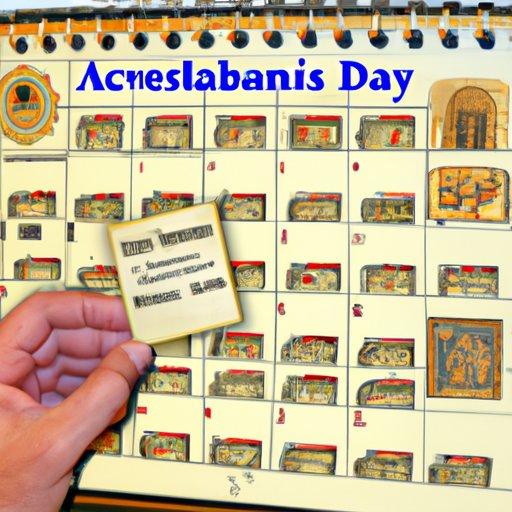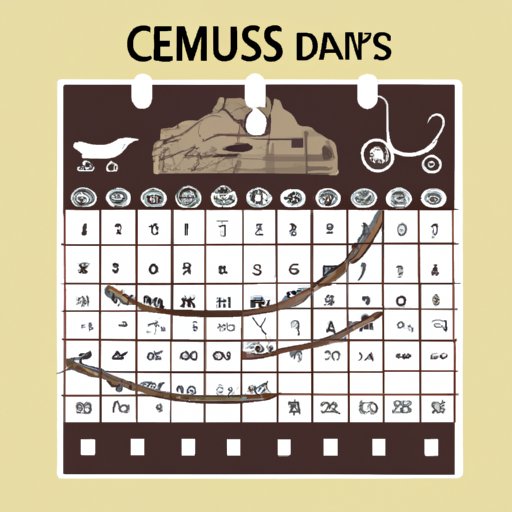Introduction
A calendar is an organized system of marking the passage of time by measuring and recording days, weeks, months, and years. Calendars have been used for centuries to keep track of important events, holidays, and other special occasions. But when were calendars first invented?
The answer to this question is complex and has been the subject of debate among scholars for many years. In this article, we will explore the history and development of calendars across different cultures and civilizations in order to uncover the mysteries of when calendars were first invented.

A Historical Look at the Origins of Calendars
Calendars have been used since ancient times. The earliest known calendars date back to 4th millennium BCE in Mesopotamia. These early calendars were based on lunar cycles and were used to organize religious festivals, agricultural activities, and other important events.
Ancient Egyptians used a solar calendar that was divided into 12 months of 30 days each, with five additional days added at the end of each year. This calendar was used to measure the annual flooding of the Nile River and to plan important religious festivals. The Ancient Greeks and Romans followed a similar calendar system, but with slight variations.
Exploring the Ancient Invention that Changed Our Lives: The Calendar
Calendars are an invaluable tool for organizing our lives and keeping track of important dates. They provide us with a way to make sense of time and space, allowing us to plan our days and weeks in advance. Calendars also help us remember birthdays, anniversaries, holidays, and other special occasions.
In addition to providing structure to our lives, calendars also serve as a reminder of our shared history and culture. Calendars are a reflection of the beliefs and values of the people who created them, and they provide us with insight into the past. From ancient times to the present day, calendars have been used to mark significant moments in time.
Understanding the Evolution of Time-keeping Through Calendars
Throughout history, different cultures have developed their own unique calendars. Some calendars are based on lunar cycles, while others are based on solar cycles. Other calendars are linked to religious or cultural festivals, such as the Chinese Lunar New Year or the Hindu Diwali. Each culture has its own way of keeping track of time.
In addition to the traditional calendars, there are also modern calendars that are used for more practical purposes, such as scheduling meetings and appointments. Digital calendars, such as Google Calendar and Outlook Calendar, are also popular today and allow users to easily share and manage their schedules.

Mapping Out the Development of the Calendar Across Cultures
Early Chinese calendars were based on a lunar cycle and were used to predict the movement of the stars and planets. The Chinese also used a solar calendar to track the movements of the sun and moon and to predict seasonal weather patterns.
Hindu calendars are based on the lunisolar cycle and are used to track religious festivals and holidays. Islamic calendars are based on the lunar cycle and are used to determine the start and end of Ramadan, the ninth month of the Islamic calendar.

Uncovering the Mysteries of When Calendars Were First Invented
Despite centuries of research, the exact date when calendars were first invented remains a mystery. However, evidence from ancient artifacts suggests that calendars were being used as early as 4th millennium BCE in Mesopotamia. Recent archaeological discoveries have also revealed evidence of calendars in Ancient Egypt, Greece, and Rome.
These discoveries have shed light on the evolution of time-keeping through the ages and have provided valuable insight into the development of calendars across different cultures.
Conclusion
Calendars have been used for centuries to keep track of time and to plan important events. The exact date when calendars were first invented remains a mystery, but evidence from ancient artifacts and recent discoveries suggest that calendars were being used as early as 4th millennium BCE in Mesopotamia.
Today, calendars are an invaluable tool for organizing our lives and keeping track of important dates. They provide us with a way to make sense of time and space, and to plan our days and weeks in advance. Calendars are a reflection of the beliefs and values of the people who created them, and they continue to have a profound impact on our lives.
(Note: Is this article not meeting your expectations? Do you have knowledge or insights to share? Unlock new opportunities and expand your reach by joining our authors team. Click Registration to join us and share your expertise with our readers.)
